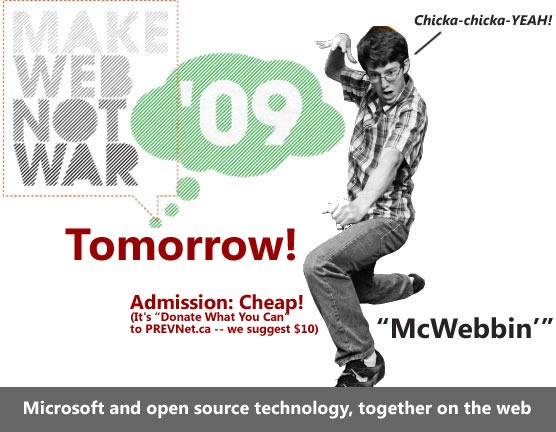Make Web Not War
Jul 30, 2009 15:41
A few weeks ago I went to Microsoft Canada's "Make Web Not War" conference in downtown Toronto. It was a one-day showcase of Microsoft's new attitude towards the open source and web development communities.
I'm going to get the key message out right up front. It's a good key message and it has actually shocked and amazed some of the people who have heard it:
Microsoft now supports PHP directly on their IIS server stack.
That's right. PHP can now live happily alongside all of the .NET frameworks and other server technologies you may have on an IIS box. You can go all the way from small in-line PHP calls for showing the current date, all the way up to running Drupal on your IIS servers. There are single-click installers for common tools such as WordPress and the like. It even works with mySQL, although for various reasons (more legal than technical, it seems) it is a separate download and install - but it still seems straightforward.
If your first response (like mine) is "so what? I use Linux for hosting, which gives me more power and flexibility without having to pay a licensing fee" remember that many organizations are locked in to using Microsoft technologies - just think of how many people are still stuck using Internet Explorer 6 because of company policies, and imagine how that extends to the server room. Now people running IIS servers have a wealth of extra tools and applications they can run on those machines - and, of course, importantly for Microsoft, they're now not going to ditch IIS because they want to run Drupal.
Here's another key message that Microsoft is trying to get out:
Microsoft doesn't hate Open Source anymore. It isn't trying to kill it. Microsoft will still compete with companies like it always has, but it won't compete with platforms and movements anymore.
You may have more difficulty accepting this second message than the first one. Policy and strategic decisions are easier to make and to change than actual implemented technologies. That said, I think Microsoft has been waking up to the new world of software that has grown up in the last five to ten years: flexible, lightweight, responsive, open-source tools and applications are running circles around 'Enterprise' software.
I don't think Microsoft has entirely made up its mind - it's a big company and it moves slowly, and there must be many factions in play internally. However, the winds of change do seem to be blowing from Redmond (and Mississauga): they're getting their technology together (Windows 7 seems a big improvement over Vista, for example), they're hiring people like Joey 'Accordion Guy' deVilla and David Crow, and they're starting to do some serious community outreach - like this conference.
The conference had some interesting talks, great schwag, and some serious gear on display in the lounge (immersive triple-screen FarCry tournaments with force-feedback vests on Alienware machines, anyone?) - but the tone felt just a little bit "off" to me.
Clearly Microsoft Canada have a crack promotions and marketing team - but I think they're more used to communicating with corporate and large institutional clients, and the kinds of 'day job' people who work there, than with the passionate, results-focused, and somewhat more quirky and bohemian agile / open-source crowd. The conference gave me the impression of a team of corporate types racking their brains trying to think of what would appeal to a nerdy twenty-something male open source hacker.

(Image pulled from Global Nerdy)
XBox on Widescreen TV? Check. Video Games? Check. Pizza? Check. Energy drinks? Check. Wrestling-themed 'showdown' with one of the apps called "SuxOr"? Check. (Actually I'm sorry I had to leave early and missed that one).
Actually, they got it 100% right on one thing - and it was repeated many times during the conference:
We're really really sorry about Internet Explorer 6. We mean it. Really sorry.
That one hit home - but some of the other items felt, well, a bit forced.
Of course Microsoft has plenty of internal staff who are great hackers and understand this stuff. In fact, a number of them gave presentations. However, while a number of open-source types attended, a sizeable portion of the crowd were the more 'day job' type of people who seem to have used the conference as an excuse to get out of their cubicles for a day.
So in one of the afternoon sessions, when the presenter introduced Microsoft's CodePlex for hosting Open Source applications by asking "Who here has a cool open-source application that they want to share with the world?" - he was met with total silence, while people checked their email.
I think the situation is a bit like that time in grade school (I think it was grade 5 for me) when all of a sudden it was socially acceptable for boys and girls to like each other. Up until then, boys considered girls 'icky' and vice-versa, but the social context between the two groups had changed from hostility to something else. The situation was so new that nobody really knew how to act around each other. Encounters were full of false steps, awkward misunderstandings, and wrong expectations. I think Microsoft and the Agile / Open-Source developers are in a similar situation. A few years ago they were putting worms in each others' shoes, but now they're trying to figure each other out on better terms.
I don't think they'll be caught kissing out behind the field house, though - but you never know.